- Home
- Fredric Brown
Night of the Jabberwock Page 17
Night of the Jabberwock Read online
Page 17
Well, I couldn’t answer when he said “Good night, Doc,” just before he closed the door behind him. Something felt a little wrong with my throat, and if I’d tried to say anything, I might have bawled.
My hand shook a little as I poured myself another drink, a short one. I was beginning to feel them and this had better be my last one, I knew.
I had to think more clearly than I’d ever thought before. I couldn’t get drunk, I didn’t dare.
I tried to get my mind back to what I’d been thinking about—what I’d been talking about to the little man who wasn’t there—before Smiley’s coming downstairs and Kates’ knocking had interrupted me.
I looked across the table where Yehudi Smith, in my mind, had been sitting. But he wasn’t there. I couldn’t bring him back. He was dead, and he wouldn’t come back.
The quiet room in the quiet night. The dim light of the single twenty-watt bulb over the cash register. The creaking of my thoughts as I tried to turn them back into the groove. Connect facts.
Lewis Carroll and bloody murder.
Through the Looking-Glass and What Alice Found There.
What had Alice found there?
Chessmen, and a game of chess. And Alice herself had been a pawn. That was why, of course, she’d crossed the third square by railroad. With the smoke alone worth a thousand pounds a puff—almost as expensive as the smoke from my cigar might have been had not Smiley taken it out of my hand and claimed it as his own.
Chessmen, and a game of chess.
But who was the player?
And suddenly I knew. Illogically, because he didn’t have a shadow of a motive. The Why I did not see, but Yehudi Smith had told me the How, and now I saw the Who.
The pattern. Whoever had arranged tonight’s little chess problem played chess all right, and played it well. Looking-glass chess and real chess, both. And he knew me well—which meant I knew him, too. He knew my weaknesses, the things I’d fall for. He knew I’d go with Yehudi Smith on the strength of that mad, weird story Smith had told me.
But why? What had he to gain? He’d killed Miles Harrison, Ralph Bonney and Yehudi Smith. And he’d left the money Miles and Ralph had been carrying in that brief-case and put it in the back of my car, with the two bodies.
Then money hadn’t been the motive. Either that, or the motive had been money in such large quantity that the couple of thousand dollars Bonney had been carrying didn’t matter.
But wasn’t a man concerned who was one of the richest men in Carmel City? Ralph Bonney. His fireworks factory, his other investments, his real estate must have added up to—well, maybe half a million dollars. A man shooting for half a million dollars can well abandon the proceeds of a two-thousand dollar holdup and leave them with the bodies of the men he has killed, to help pin the crime on the pawn he has selected, to divert suspicion from himself.
Connect facts.
Ralph Bonney was divorced today. He was murdered tonight.
Then Miles Harrison’s death was incidental. Yehudi Smith had been another pawn.
A warped mind, but a brilliant mind. A cold, cruel mind. And yet, paradoxically, a mind that loved fantasy, as I did, that loved Lewis Carroll, as I did.
I started to pour myself another drink and then remembered that I still had only part of the answer, and that even if I had it all, I hadn’t the slightest idea what I could do with it, without a shred of evidence, or an iota of proof.
Without even an idea, in my own mind, of the reason, the motive. But there must be one; the rest of it was too well planned, too logical.
There was one possibility that I could see.
I sat there listening a while to be sure there was no car approaching; the night was so quiet that I could have heard one at least a block away.
I looked at the gun Smiley had given me back, hesitated, and finally put it in my pocket. Then I went into the back room and let myself out of the window into the dark alley.
Carl Trenholm’s house was three blocks away. Luckily, it was on the street next to Oak Street and parallel to it. I could make all of the distance through the alley except for the streets I’d have to cross.
I heard a car coming as I approached the second street and I ducked down and hid behind a garbage can until it had gone by. It was going slowly and it was probably either Hank and the sheriff or the two deputies. I didn’t look out to see for fear they might flash a spotlight down the alley.
I waited until the sound of it died away completely before I crossed the street.
I let myself in the back gate of Carl’s place. With his wife away, I wasn’t positive which bedroom he’d be sleeping in, but I found pebbles and tossed them at the most likely window and it was the right one.
It went up and Carl’s head came out. I stepped close to the house so I wouldn’t have to yell. I said, “It’s Doc, Carl. Don’t light a light anywhere in the house. But come down to the back door.”
“Coming, Doc.” He closed the window. I went up on the back porch and waited until the door opened and I went in. I closed the door behind me and the kitchen was as black as the inside of a tomb.
Carl said, “Damned if I know where a flashlight is, Doc. Can’t we put on a light? I feel like hell.”
“No, leave it off,” I told him. I struck a match, though, to find my way to a chair and it showed me Carl in rumpled pyjamas, his hair mussed and looking like he was in for the grandfather of all hangovers.
He sat down, too, while the match flared. “What’s it about, Doc? Kates and Ganzer were here looking for you. Waked me up a while ago, but they didn’t tell me much. Are you in a jam, Doc? Did you kill somebody?”
“No,” I said. “Listen, you’re Ralph Bonney’s lawyer, aren’t you? I mean on everything, not just the divorce today.”
“Yes.”
“Who’s his heir, now that he’s divorced?”
“Doc, I’m afraid I can’t tell you that. A lawyer isn’t supposed to tell his clients’ business. You know that as well as I do.”
“Didn’t Kates tell you Ralph Bonney is dead, Carl? And Miles Harrison? They were murdered on their way back from Neilsville with the payroll, somewhere around midnight.”
“My God,” Carl said. “No, Kates didn’t tell me.”
I said, “I know you’re still not supposed to tell his business until a will is probated, if there is one. But listen, let me make a guess and you can tell me if I’m wrong. If I guess right, you won’t have to confirm it; just keep your mouth shut.”
“Go ahead, Doc.”
“Bonney had an illegitimate son about twenty-three years ago. But he supported the boy’s mother all her life until she died recently; she worked, too, as a milliner but he gave her enough extra so that she lived better than she would have otherwise, and she sent the boy to college and gave him every break.”
I stopped there and waited and Carl didn’t say anything.
I went on, “Bonney still gave the boy an allowance. That’s how he—hell, let’s call him by name—that’s how Al Grainger has been living without working. And unless he knows he’s in Bonney’s will, he’s got proof of his parentage and can claim the bulk of the estate anyway. And it must be half a million.”
Carl said, “I’ll talk. It’ll run about three hundred thousand. And you guessed right on Al Grainger, but how you guessed it, I don’t know. Bonney’s relations to Mrs. Grainger and to Al have been the best-kept secret I’ve ever known of. In fact, outside the parties concerned, I was the only person who ever knew—or even suspected. How did you guess?”
“By what happened to me tonight—and that’s too complicated to explain right now. But Al plays chess and has the type of mind to do things the complicated way, and that’s the way they happened. And he knows Lewis Carroll and——” I stopped because I was still after facts and I didn’t want to start explaining.
The night was almost over. I saw a greenish gleam in the darkness that reminded me Carl wore a wrist watch with a luminous dial. “What time is it?”
I asked him.
The gleam vanished as he turned the dial toward himself. “Almost five o’clock. About ten minutes off. Listen Doc, you’ve got so much you might as well have the rest. Yes, Al has proof of his parentage. And, as an only child, illegitimate or not, he can claim the entire estate now that Bonney isn’t married. He could have cut in for a fraction of it, of course, even before the divorce.”
“Didn’t he leave a will?”
“Ralph didn’t ever make a will. Superstitious about it. I’ve often tried to talk him into making one, but he never would.”
“And Al Grainger knew that?”
Carl said, “I imagine he would have.”
“Is there any reason why Al would have been in such a hurry?” I asked. “I mean, would there have been any change in status if he’d waited a while instead of killing Bonney the night after the divorce?”
Carl thought a minute. “Bonney was planning to leave tomorrow for a long vacation. Al would have had to wait several months, and maybe he figured Bonney might re-marry—meet someone on the cruise he was going to take. It happens that way, sometimes, on the rebound after a divorce. And Bonney is—was only fifty-two.”
I nodded—to myself, since Carl couldn’t see me in the darkness. That last bit of information covered everything on the motive end.
I knew everything now, except the details and they didn’t matter much. I knew why Al had done everything that he had done; he had to make an airtight frame on someone because once he claimed Bonney’s estate, his own motive would be obvious. I could even guess some of the reasons why he’d picked me for the scapegoat.
He must have hated me, and kept it carefully under cover. I could see a reason for it, now that I knew more about him. I’ve got a loose tongue and often swear at people affectionately, if you know what I mean. How often, when Al had beaten me in a game of chess had I grinned at him and said, “All right, you bastard. But try to do it again.”
Never dreaming, of course, that he was one, and knew it.
He must have hated me like hell. In some ways he could have picked an easier victim, someone more likely than I to have committed murder and robbery for money. Choosing me, his plan took more gobbledegook; he had to give me such a mad story to tell that nobody would believe a word of it and would think, instead, that I’d gone insane. Of course, too, he knew how much Kates hated me; he counted on that.
A sudden thought shook me; could Kates have been in on the deal with Al? That would account for his trying to kill me rather than lock me up. Maybe that was the deal—for a twenty or fifty thousand dollar cut of the estate, Kates had agreed to shoot me down under the pretence that I had attacked him or had tried to escape.
No, I decided on second thought, it hadn’t been that way. I’d been alone with Kates in his office for almost half an hour while Hank Ganzer had been on his way back from Neilsville. It would have been too easy for Kates to have killed me then, planted a weapon on me and claimed that I’d come in and attacked him. And when the two bodies had been found in my car, the story would have been perfectly credible. It would even have pointed up the indication that I’d gone homicidally insane.
No, Kates’ motives for wanting to kill me had been personal, sheer malice because of the things I’d written about him in editorials and the way I’d fought him in elections. He’d wanted to kill me and had seen a sudden opportunity when the bodies had been found in my car. He’d passed up a much better chance because, when I was alone with him for so long in his office, he hadn’t known the bodies were there.
No, definitely this was a one-man job, except for Yehudi Smith. Al had hired Smith to keep me diverted, but when Smith’s job was done, he was eliminated. Another pawn. Chess isn’t a team game.
Carl said, “How are you mixed in this, Doc? What can I do?”
“Nothing,” I said. It was my problem, not Carl’s. I’d kept Smiley out of it; I’d keep Carl out of it, too. Except for the information and help he’d already given me. “Go up to bed, Carl. I’ve got a little more thinking to do.”
“Hell with that. I can’t sleep with you sitting down here thinking. But I’ll sit here and shut up unless you talk to me. You can’t tell whether I’m here or not anyway, if I shut up.”
I said, “Shut up, then.”
Proof, I thought. But what proof? Somewhere, but God knew where, was the dead body of the actor Al had hired to play the role of Yehudi. But this had been planned, and well planned. Suitable disposal of that body had been arranged for long before Al had taken it away from the Wentworth place. It wasn’t going to turn up at random and one guess was as good as another as to where he’d hidden or buried it. He’d had hours to do it in and he’d known in advance every step he was going to take.
The car in which Yehudi Smith had driven me to the Wentworth house and which he’d switched for my own car after he’d used mine for the supposed holdup. No, I couldn’t find that car as proof and it wouldn’t mean anything if I did. It could have been—probably was—a stolen car, and now returned to wherever he’d stolen it from, never missed by its owner. And I didn’t even remember what make or model it was. All I remember was that it had an onyx gear shift knob and a push-button radio. I didn’t even know whether it was a Cadillac, convertible or a Ford business coupé.
Had Al arranged any kind of an alibi for himself?
Maybe, maybe not, but what did it matter unless I could find something against him besides motive? That, and my own certainty that he’d done it. I hadn’t any alibi, none at all. I had an incredible story and two bodies and the stolen money in my car. And a sheriff and three deputies looking for me and ready to shoot on sight.
I had the murder weapon in my pocket. And another gun, too, a loaded one.
Could I go to Al Grainger and scare him into writing out and signing a confession?
He’d laugh at me. I’d laugh at myself for trying. A man with the warped brain that would work out something like Al’s plan tonight wasn’t going to tell me what time it was just because I pointed a gun at him.
A faint touch of light was showing at the windows. I could even make out Carl sitting there across the table from me.
“Carl,” I said.
“Yes. Doc? Say, I was letting you think, but I’m glad you spoke. Just had an idea.”
“An idea’s what I need,” I told him. “What is it?”
“Want a drink?”
I asked, “Is that the idea?”
“That’s the idea. Look, I’m hung over to hell and back and I can’t have one with you, but I just realized what a lousy host I was. Do you want one?”
“Thanks,” I said, “but I had a drink. Listen, Carl, talk to me about Al Grainger. Don’t ask me what to say. Just talk.”
“Anything, at random?”
“Anything, at random.”
“Well, he’s always impressed me as being a little off the beam. Brilliant, but—well, twisted, somehow. Maybe his knowledge of who and what he was contributed to that. Smiley always felt that, too; he’s mentioned it to me. Not that Smiley knows who or what Al is, but he just felt something was wrong.”
I said, “My opinion of Smiley has changed a lot tonight. He’s smarter, and a better guy, than both of us put together, Carl. But go on about Al.”
“Touch of Oedipus, complicated by bastardy. Probably, in some obscure way, managed to blame Bonney for his mother’s death. Not a real paranoiac, but near enough to do something like that. Sadism—most of us have a touch of it, but Al a little more than most.”
I said, “Most of us have a touch of everything. Go on.”
“Pyrophobia. But you know about that. Not that we haven’t all got phobias. Your acrophobia and my being afraid of cats. But Al’s is pretty bad. So afraid of fire that he doesn’t smoke and I’ve noticed him wince when I’ve lighted a cig——”
“Shut up, Carl,” I said.
I should have thought of it myself, sooner. A lot sooner.
I said, “I’ll have that drink, Carl. Just one
, but a good one.”
I didn’t need it physically, but I needed it mentally this time. I was scared stiff at the very thought of what I was going to do.
CHAPTER FIFTEEN
One, two! One, two! and through and through
The vorpal blade went snicker-snack!
He left it dead, and with its head
He went galumphing back.
THE windows were faint grey rectangles; now with my eyes accustomed to the decreasing darkness, I could see Carl almost clearly as he went to the cupboard and groped until he had the bottle he was looking for.
He said, “Doc, you sound happy enough that I’ll have one with you. Hair of the dog, for me. Kill or cure.”
He got two glasses, too, from over the sink, breaking only one glass by knocking it into the sink in the process. He said a nasty word and then brought the glasses to the table. I struck a match and held it while he poured whisky into them.
He said, “Damn you, Doc, if you’re going to do this often, I’m going to get some luminous paint. I could paint bands around the glasses and the bottle. And say, know what else I could do? I could paint a chessboard and a set of chessmen with luminous paint, too. Then we could sit here and play chess in the dark.”
“I’m playing, Carl, right now. I just reached the seventh square. Maybe somebody’ll crown me on the next move, when I reach the king-row. Have you got any cleaning fluid?”
He started to reach for his glass, but he pulled his hand back and looked at me instead.
“Cleaning fluid? Isn’t whisky good enough for you?”
“I don’t want it to drink,” I explained. “I want it not to burn.”
He shook his head a trifle. “Again and slowly.”
“I want some of the kind that isn’t inflammable. You know what I mean.”
“Wife’s got some kind of cleaning fluid around. Whether it’s that kind or not, I don’t know. I’ll look.”

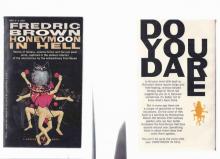 Hall of Mirrors
Hall of Mirrors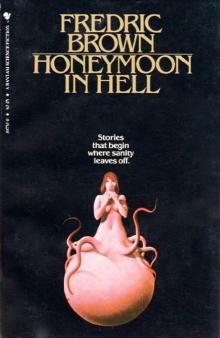 Honeymoon in Hell
Honeymoon in Hell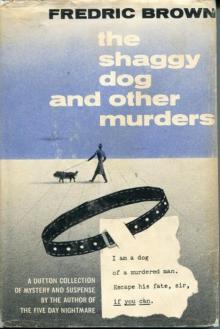 The Shaggy Dog and Other Murders
The Shaggy Dog and Other Murders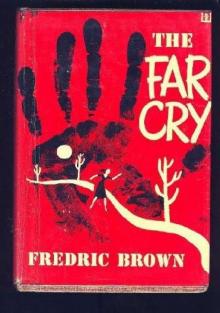 The Far Cry
The Far Cry Arena
Arena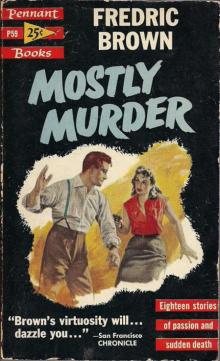 Mostly Murder
Mostly Murder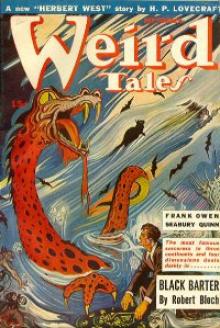 The Geezenstacks
The Geezenstacks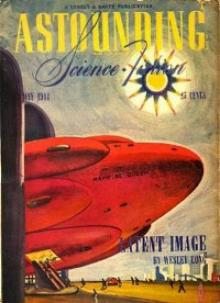 The Yehudi Principle
The Yehudi Principle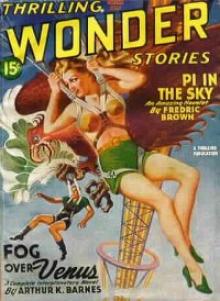 Pi in the Sky
Pi in the Sky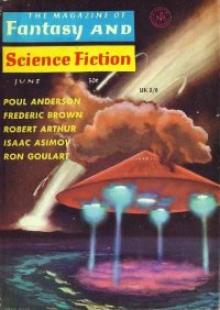 Eine Kleine Nachtmusik
Eine Kleine Nachtmusik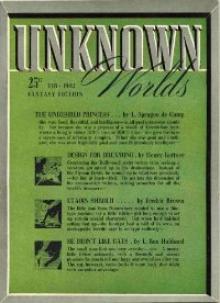 Etaoin Shrdlu
Etaoin Shrdlu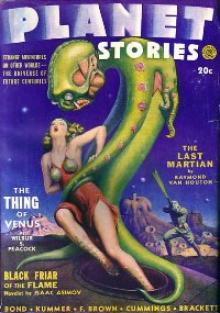 The Star Mouse
The Star Mouse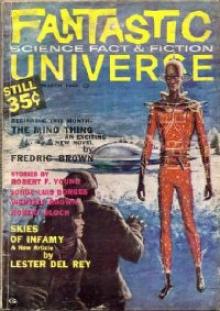 The Mind Thing
The Mind Thing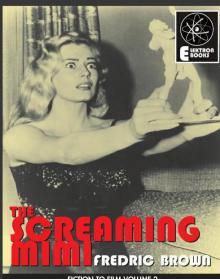 The Screaming Mimi
The Screaming Mimi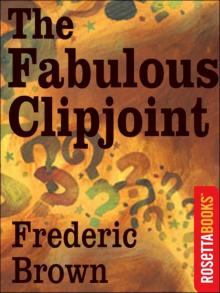 The Fabulous Clipjoint
The Fabulous Clipjoint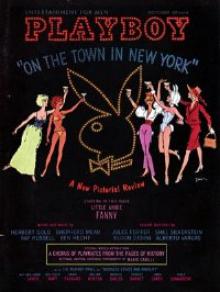 Puppet Show
Puppet Show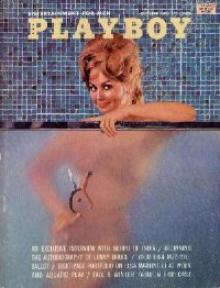 It Didn't Happen
It Didn't Happen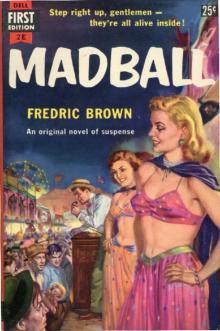 Madball
Madball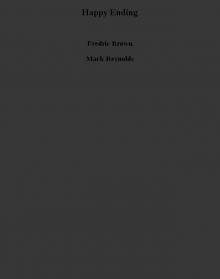 Happy Ending
Happy Ending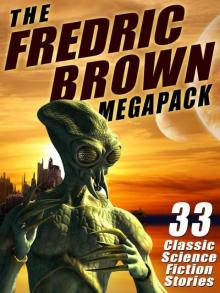 The Fredric Brown Megapack: 33 Classic Science Fiction Stories
The Fredric Brown Megapack: 33 Classic Science Fiction Stories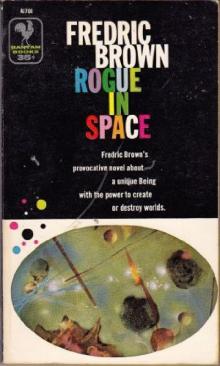 Rogue in Space
Rogue in Space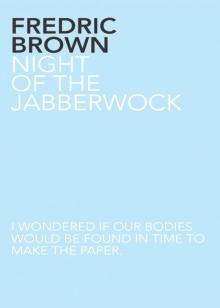 Night of the Jabberwock
Night of the Jabberwock The Dead Ringer
The Dead Ringer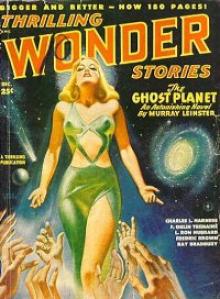 Knock
Knock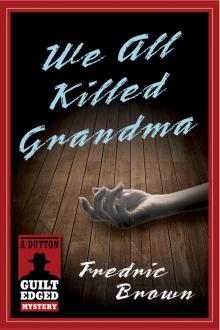 We All Killed Grandma
We All Killed Grandma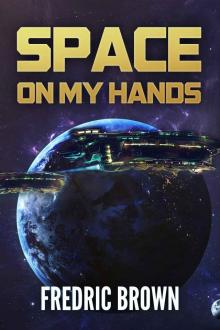 Space On My Hands
Space On My Hands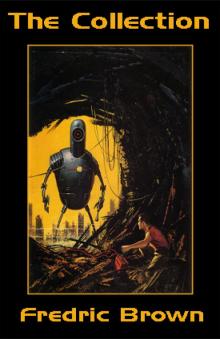 The Collection
The Collection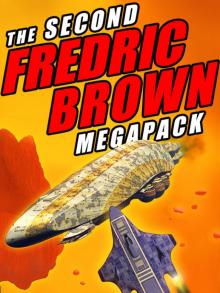 The Second Fredric Brown Megapack: 27 Classic Science Fiction Stories
The Second Fredric Brown Megapack: 27 Classic Science Fiction Stories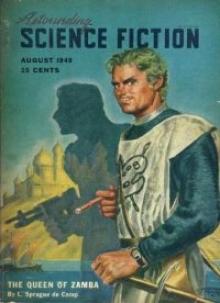 Letter to a Phoenix
Letter to a Phoenix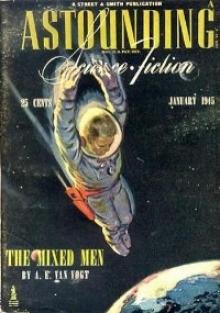 The Waveries
The Waveries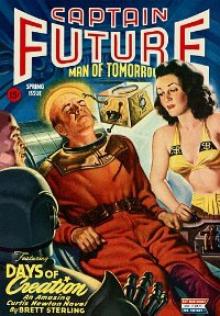 Nothing Sirius
Nothing Sirius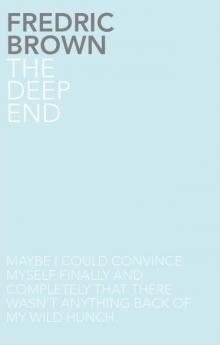 The Deep End
The Deep End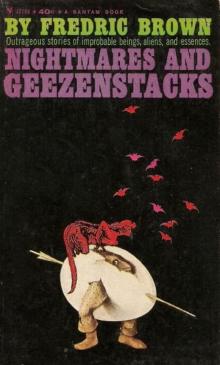 Nightmares & Geezenstacks
Nightmares & Geezenstacks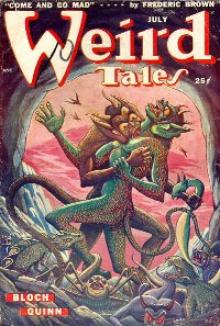 Come and Go Mad
Come and Go Mad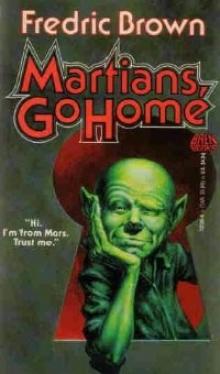 Martians, Go Home
Martians, Go Home